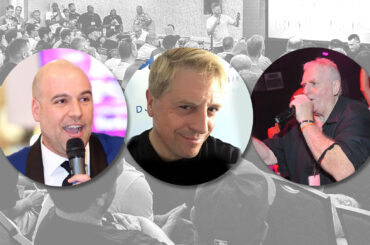In the DJ world and beyond, it’s become easier than ever to become a viral celebrity, seemingly overnight. Thanks to the nature of social media, that can be a gift or a curse, depending on whom you ask.
And that’s essentially the story of dubstep darling Getter, who broke out quickly on the music scene, then rode a meme-wave to epic notoriety. While he may be known for comedic antics and a trademark phrase (“Suh Dude”) from his time on the viral app, Vine, Tanner Petulla’s journey into the spotlight started at the age of 16.
Growing up in San Jose, Calif., Petulla was musically inclined, playing drums and guitar in a few teen bands. Later, after falling in love with rap music, Petulla began producing tracks while in high school, and the bass community quickly began to take notice.
Viewed as somewhat of a prodigy, Getter soon became known as “the unsung hero of underground bass culture.” Getter’s profound production prowess on monstrous, early tracks like “Vile Orchestra” and “Berzerker” (circa 2011) caught the attention of genre pioneer Datsik, which led to releases on bass juggernaut Firepower Records and his first run of tour dates around the United States.
Continuing to evolve his sound around his signature use of guttural synths, the blossoming talent would befriend Skrillex following a demo exchange that would lead to Getter’s 2015 breakout single, “Head Splitter,” being signed to OWSLA, Skrillex’s forward-thing label.
Getter’s sound would continue to mature, and he would showcase his versatility by unveiling an alias, Planet Neutral, which allowed the electronic community to hear him from a whole new angle, more relaxed and mellow.
But slowly stepping away from his relentless, dubstep roots, Getter’s next OWSLA release, 2016’s seven-track EP “Wat The Frick,” was a significant departure from what fans had come to expect from him. And he would receive some backlash from those claiming that he’d ditched his popular, signature sound. It’s a conundrum many successful producers deal with at some point in their careers.
Nonetheless, Getter remained a prominent force in the electronic scene this past year, dominating the festival circuit and headlining his own North American tour. Additionally, he launched Shred Collective – his own record label, clothing brand, and artist collective. Along with fellow meme-hustler Nick Colletti, Getter sells plenty of “Suh Dude” merch via their Trippy Burger label.
Recently, Getter announced that, following the release of an EP, album and whatever else he chooses to share from the boatload of music he is sitting on at the moment, he plans to take a hiatus from the rigorous realm of electronic music. After nearly 30 artist releases (albums, EPs, singles, collabs) and 28 remixes in the space of seven years, he’s certainly earned a break from the action. DJ Times had the opportunity to chat with Getter to discuss his most recent releases, the current state of the scene and much more.
DJ Times: Growing up, you were in a few bands and played the guitar, but who was it that introduced you to the world of electronic music?
Getter: Well, me and all my friends loved metal – not just the sound of it, but the vibe. It was angry and scary, but also catchy and technical. One of my friends stumbled upon some old Caspa and Rusko that had a similar vibe – instant stank face!
DJ Times: What is your opinion of all these metal/dubstep hybrid tracks popping up recently? A long time coming?
Getter: Ehhh, I mean they are definitely worth a try. I think the only really cool one is Excision and Space Laces’ “Throwin’ Elbows.” It’s got just a touch of heavy metal in it that makes it work. I’ve heard a lot of botched attempts, but I appreciate the effort.
DJ Times: What was so appealing about the dubstep sound that you wanted to produce it yourself?
Getter: At first, it was just the cool sounds, and the cadence of it all. But the more I got into it, I got fascinated with the engineering side of things. I’ve always said that it doesn’t matter how complicated the song is, it just matters how well it’s made.
DJ Times: When would you say that it clicked and you knew you wanted to pursue being a DJ/producer full-time?
Getter: Probably when I made a few remixes, early on, and people from my hometown would stop me on the street for a high five. That and when I could afford to buy my own stuff… I was like, “OK, yeah, I’m down.”
DJ Times: DJing or production – which came first?
Getter: Production. What would you DJ if no production? [laughs]
DJ Times: Do you remember what DAW program you were using to produce back then?
Getter: Hell, yeah! [Propellerhead] Reason 4 or 5. I can’t remember exactly which one. I highly recommend it for beginners! There are synths in Reason that are exclusive to Reason only, and it’s sort of an all-in-one-style program.
DJ Times: But now, you’re using Ableton Live, right? Is it your go-to production software?
Getter: Yes! I’ve been on Reason, Logic 9, Logic X, and now Ableton Live. It’s fluid for me – it feels good.
DJ Times: When it comes to production, walk us through a studio session with Getter.
Getter: Oh boy, that’s a hard one. I only really go to my studio to mix stuff or record final vocals. Other than that, if you see me on my laptop, anywhere, I’m working on music.
DJ Times: Speaking of production, how did you first start working with Splice [the cloud-based music creation/collab platform]?
Getter: I wish I remembered the exact time I did. I just remember hearing about their “drop box” feature, or whatever, and then they did Splice Sounds [Sample Library], which I think is the best thing to happen to music since Spotify.
DJ Times: For any producers who may be unfamiliar with the platform, how useful is Splice Sounds?
Getter: Oh, my God – it’s the best! Usually, you buy sample packs from $20 to $500, and only use a handful or samples. But with Splice, you pay for credits, and you can buy one single sample from any sample pack – and preview it first. If you need someone screaming, pull up Splice Sounds and type in “scream” and hundreds of samples come up. Not to mention, it saves on a cloud which is very, very helpful.
DJ Times: What does Getter look for when it comes to samples?
Getter: I usually only use samples for percussion, drum hits, and effects. But anything else, I like to look for memorable sounds from the past… or just fart noises to be honest. [laughs]
DJ Times: Where do you find inspiration?
Getter: Recently, I’ve been finding inspiration in myself. I dig through whatever it is that I’m feeling and pinpoint the true meaning of it. It helps with music and just everyday life.
DJ Times: You’ve been a part of this music-making scene since 2010, what are some changes you’ve noticed over the years?
Getter: Oh boy, I promised myself to stay positive as much as I can, so let’s start with that. I see a lot more young artists killing it and moving the genre forward with experimentation and risks. The bad side… there are a lot more “gimmicks” and shit. Don’t get me wrong, I had mine, but I stayed true to myself throughout. If I’m a dick, I’m a dick; if I’m funny, I’m funny. But too many people in the scene nowadays are just cookie-cutter shapes at this point. They all post the same shit. It feels so automated. I feel like there needs to be a personal connection with your audience, rather than just… “HEY UR A DJ DUR HUR.”
DJ Times: How has the bass music scene, specifically, changed since you first emerged onto the scene?
Getter: Recently, I’ve noticed a sort of “halt” on originality. Not necessarily a bad thing, the current styles are basically being updated like your phone. Sometimes it sucks, other times it’s amazing. But I miss the days when you would hear a completely new, crazy song and be like “What?”
DJ Times: When would you say was the first time you ventured outside the realm of bass music and started experimenting with new sounds?
Getter: Probably doing some hip-hop stuff with some friends from Florida. It’s a whole new book, man, a whole new feeling. It’s fun to bounce back and forth.
DJ Times: Would you say you became bored with dubstep?
Getter: Yeah, definitely. I got like 40 unreleased tracks right now, maybe two or three are dubstep – no particular reason. I just enjoy making everything. If you corner yourself into a specific type of music, writer’s block haunts you. I can’t remember the last time I had writer’s block.
DJ Times: You recently connected with Party Nails for “Solo.” How did that track come together?
Getter: “Solo” started out as an “Ocho Cinco” remix for DJ Snake. I started it last year on the “Wat The Frick” tour. I slowly fell in love with it and was lucky enough to have DJ Snake tell me to do whatever I wanted with it. He’s such a cool dude, but it was an instrumental for a while, and my day-to-day manager [Christina Boemio of SLVYVLL] sent me Party Nails’ SoundCloud. The rest is history.
DJ Times: You dropped “Big Mouth” not too long ago, and have been sprinkling some new tunes into your most recent sets. The question everyone wants to know: Will these be featured on your forthcoming album?
Getter: It’s hard to say, really. I have enough music to put out three albums right now. [laughs] I really don’t want to mix my album’s styles anymore. I find if I put four heavy songs and two mellow songs on an EP, the mellow ones get slept on. So, if “Big Mouth” were to come out in anything, it’d probably be an EP soon.
DJ Times: What can we expect from this album?
Getter: Ohhh boy, this album is my baby, and my baby’s baby. It’s almost two years in the works, working with some of my favorite vocalists. Don’t expect any heavy hitters – this is more of a “debut-type” thing. I want people to see my softer side, the side that means most to me.
DJ Times: When your album finally drops, what is Getter’s plans in the realm of electronic dance music going forward?
Getter: Low-key, probably… gonna take a break for a while. Pump the brakes a little bit, but who knows?







